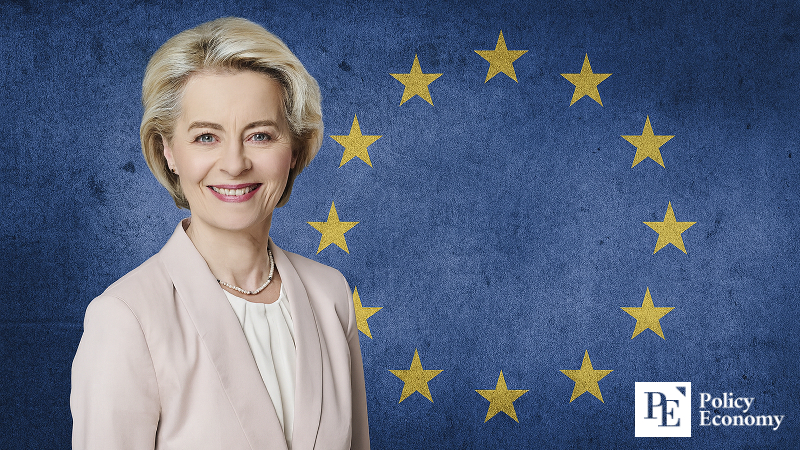Trust in Von der Leyen Erodes Amid Anger at ‘Humiliating’ U.S.–EU Deal
Input
Changed
52% of EU Citizens View U.S.–EU Trade Deal Negatively Commission President Ursula von der Leyen Loses Public Trust European Parliament Moves Toward Another No-Confidence Vote Within Months

A recent survey shows that a majority of European Union (EU) citizens view the trade agreement with the United States as “humiliating,” reflecting growing sentiment that the deal brings little benefit to Europe’s economy. Compounding the backlash, public trust in European Commission President Ursula von der Leyen is eroding, with criticism mounting over her failure to secure leverage in the negotiations.
Was the U.S.–EU Trade Deal a Failure?
According to a Guardian report on the 9th, French think tank Groupe d’Études Géopolitiques (GEG) commissioned polling firm Cluster17 to survey 5,302 citizens across Germany, France, Italy, Spain, and Poland between June 30 and July 4. The results showed that 52% of respondents considered the U.S.–EU trade agreement humiliating. Another 22% said they were indifferent, while only 8% felt reassured and just 1% expressed pride.
Only 2% believed the deal benefited Europe’s economy, while a striking 77% said it primarily served the U.S. economy. Negative views extended to both negotiators: President Donald Trump and European Commission President Ursula von der Leyen. Some 75% judged von der Leyen to have defended European interests “very poorly” or “quite poorly,” while 41% said they “do not trust her at all” and 31% “not very much.” As many as 60% supported her resignation.
Von der Leyen struck the deal with Trump in late July, agreeing to impose 15% tariffs on most EU-made goods, while committing to $750 billion worth of U.S. energy purchases over three years, $600 billion in U.S. economic investments, and $40 billion in American AI chip purchases.
No-Confidence Challenge in July
This was not the first time Ursula von der Leyen faced a crisis of confidence within the EU. Back in July, the European Parliament held a no-confidence vote against her. The motion was introduced by Romanian MEP Gheorghe Piperea of the European Conservatives and Reformists (ECR), a far-right group. He criticized von der Leyen for privately negotiating a multibillion-euro COVID-19 vaccine deal in 2021 with Pfizer CEO Albert Bourla.
At the time of signing, von der Leyen was praised for securing the vaccines Europe urgently needed. But the contract soon drew criticism for its lack of transparency and allegations of over-purchasing doses. The issue escalated into broader concerns over the European Commission’s decision-making process, with some dubbing the scandal “Pfizergate.”
In the July vote, however, the motion was rejected. Of the 533 lawmakers who participated, 360 voted against, 175 in favor, and 18 abstained. A two-thirds majority would have been required for the motion to pass. Von der Leyen did not attend the vote but later wrote on X (formerly Twitter): “When outside forces try to destabilize and divide us, it is our duty to respond true to our values,” expressing gratitude for the outcome.

Parliamentary Pressure Mounts from Both Left and Right
What stands out is that only months after the failed no-confidence motion, calls for Ursula von der Leyen’s resignation are again gaining traction in the European Parliament—this time from both ends of the political spectrum. According to Euronews, the Left group is actively pushing a new no-confidence initiative. Spokesperson Thomas Shannon argued that “the Commission is sacrificing workers and dismantling the Green Deal, undermining everything we stand for,” noting that support for the motion is building.
The Left group, which includes radical parties such as France’s La France Insoumise (LFI), Italy’s Five Star Movement (M5S), and Spain’s Podemos, holds 46 seats. Four Italian lawmakers from the Greens/European Free Alliance (Greens/EFA) have already joined the push, with more signatures being collected internally. To bring a no-confidence motion to the floor, 72 of the Parliament’s 720 members must sign.
On the other end, the far-right coalition Patriots for Europe (PfE) is preparing its own motion. Comprised of parties like France’s National Rally (RN), Italy’s Lega, and Hungary’s Fidesz, PfE controls 85 seats—enough to introduce a motion independently. The group had also supported the earlier July no-confidence effort led by the ECR.
Parliamentary rules require at least 20% of members (144 signatures) to back a new motion within two months of a previous vote, compared to the usual 10%. This means a new attempt is most likely in October, once the signature threshold reverts. Still, analysts say it is unlikely to succeed: von der Leyen’s own center-right European People’s Party (EPP) holds 188 seats, while the center-left Progressive Alliance of Socialists and Democrats (S&D)—the second-largest bloc with 136 seats—remains opposed to ousting her.






















Comment